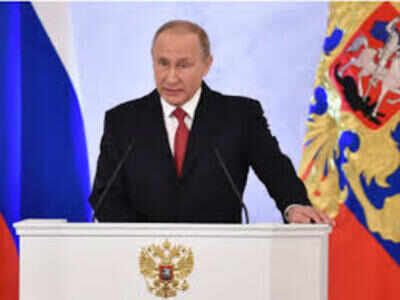
NEW DELHI: Russian President Vladimir Putin on Wednesday won the referendum vote which would allow him to extend his tenure as head of the country until 2036.
Putin reiterated that the constitutional amendments were necessary as they "improve the political system and fortify social guarantees" as well as "strengthen sovereignty."
Here is a look at what it means for Putin and and Russia:
Who is Vladimir Putin?
Putin, already in power for 20 years as president or prime minister, is the current President of Russia who has been in power since 2012. He is 67 years old.
His innings in Russia's seat of power started in 1999 where he was first appointed as the prime minister by then administrative president Boris Yeltsin.
Following Yeltsin's resignation, four months later, Putin became the president in 1999. Putin then went on to win the 2000 presidential elections in his own right securing a four-year term.
Since 1999, either as prime minister or president, Putin has been at the helm of affairs of the transcontinental nation.
78% of voters back extending Putin's rule
Almost 78% of voters in Russia approved amendments to the country's constitution that will allow President Vladimir Putin to stay in power until 2036, Russian election officials said on Thursday after all the votes were counted.
In the week-long balloting that concluded on Wednesday, 77.9% voted for the changes, and 21.3% voted against, with 100% of the precincts counted by Thursday morning, Russia's Central Election Commission said. The turnout exceeded 64%, according to officials.
The reported numbers reflect the highest level of voter support for Putin in 10 years.
In the 2018 presidential election, 76.7% of voters supported his candidacy, while in the 2012 election only 63.6% did.
What will change with the constitutional reforms?
The amendments that would allow Putin to run for two more six-year terms, in 2024 and 2030, are part of a package of constitutional changes that also outlaw same-sex marriage, mention "a belief in God as a core value" and emphasize the primacy of Russian law over international norms.
Other amendments strengthen presidential and parliamentary powers, enshrine traditional values including an effective ban on gay marriage and guarantee better minimum wages and pensions.
The other changes to the constitution include measures to respect the country's heritage and the orthodox church as well as strengthen the Kremlin over local and municipal authorities.
Putin, who is 67, could rule until the age of 83. The old constitution barred Putin, 67, from seeking re-election in 2024 when his present term in office ends.
Putin, who has been in power since 1999, has said he is not ruling out running for president again in 2024 but that he has not taken a final decision.
Irregularities during vote
The EU on Thursday called on Russia to probe reports of irregularities during a nationwide vote to approve constitutional changes.
"We are aware of reports and allegations of irregularities during the vote, including voter coercion, double voting, violation of secrecy of the vote, and allegations of police violence against a journalist who was present to observe. We expect these reports to be duly investigated because these are serious allegations," said EU spokesman Peter Stano.
The EU also criticised an amendment of the reform that gave Russian law primacy over its international commitments, which defied the decisions of the European Court of Human Rights, of which Moscow is a signatory.
Kremlin hails 'triumph' in vote extending Putin's rule
The Kremlin hailed as a "triumph" overwhelming backing in a national vote on constitutional reforms to extend President Vladimir Putin's rule.
The Kremlin "definitely considers this as a triumph," presidential spokesman Dmitry Peskov told reporters, describing the vote as a "referendum on trust" in the Russian president.
No worthy successor?
Public opinion on Putin's intentions are divided. Some people said they were sure he would try to stay in the Kremlin for as long as he could while others predicted he would step down in 2024 but thought he wanted to keep his options open so as not to become a lame duck before then.
President Vladimir Putin urged Russians to envisage the country they wanted to leave behind for their children and grandchildren during a historic vote this week to extend his rule.
But experts say that by pushing back the crucial question of who could someday replace him, Putin risks years of political stagnation that could fuel frustration with the Kremlin.
Leaving Russians without the hope of change could be dangerous.
Analysts note that Putin has failed to introduce younger political figures into the fold of the ruling elite and is unlikely to cede power to rising politicians who might introduce reforms that appeal to younger voters.
(With agency inputs)
Putin reiterated that the constitutional amendments were necessary as they "improve the political system and fortify social guarantees" as well as "strengthen sovereignty."
Here is a look at what it means for Putin and and Russia:
Who is Vladimir Putin?
Putin, already in power for 20 years as president or prime minister, is the current President of Russia who has been in power since 2012. He is 67 years old.
His innings in Russia's seat of power started in 1999 where he was first appointed as the prime minister by then administrative president Boris Yeltsin.
Following Yeltsin's resignation, four months later, Putin became the president in 1999. Putin then went on to win the 2000 presidential elections in his own right securing a four-year term.
Since 1999, either as prime minister or president, Putin has been at the helm of affairs of the transcontinental nation.
78% of voters back extending Putin's rule
Almost 78% of voters in Russia approved amendments to the country's constitution that will allow President Vladimir Putin to stay in power until 2036, Russian election officials said on Thursday after all the votes were counted.
In the week-long balloting that concluded on Wednesday, 77.9% voted for the changes, and 21.3% voted against, with 100% of the precincts counted by Thursday morning, Russia's Central Election Commission said. The turnout exceeded 64%, according to officials.
The reported numbers reflect the highest level of voter support for Putin in 10 years.
In the 2018 presidential election, 76.7% of voters supported his candidacy, while in the 2012 election only 63.6% did.
What will change with the constitutional reforms?
The amendments that would allow Putin to run for two more six-year terms, in 2024 and 2030, are part of a package of constitutional changes that also outlaw same-sex marriage, mention "a belief in God as a core value" and emphasize the primacy of Russian law over international norms.
Other amendments strengthen presidential and parliamentary powers, enshrine traditional values including an effective ban on gay marriage and guarantee better minimum wages and pensions.
The other changes to the constitution include measures to respect the country's heritage and the orthodox church as well as strengthen the Kremlin over local and municipal authorities.
Putin, who is 67, could rule until the age of 83. The old constitution barred Putin, 67, from seeking re-election in 2024 when his present term in office ends.
Putin, who has been in power since 1999, has said he is not ruling out running for president again in 2024 but that he has not taken a final decision.
Irregularities during vote
The EU on Thursday called on Russia to probe reports of irregularities during a nationwide vote to approve constitutional changes.
"We are aware of reports and allegations of irregularities during the vote, including voter coercion, double voting, violation of secrecy of the vote, and allegations of police violence against a journalist who was present to observe. We expect these reports to be duly investigated because these are serious allegations," said EU spokesman Peter Stano.
The EU also criticised an amendment of the reform that gave Russian law primacy over its international commitments, which defied the decisions of the European Court of Human Rights, of which Moscow is a signatory.
Kremlin hails 'triumph' in vote extending Putin's rule
The Kremlin hailed as a "triumph" overwhelming backing in a national vote on constitutional reforms to extend President Vladimir Putin's rule.
The Kremlin "definitely considers this as a triumph," presidential spokesman Dmitry Peskov told reporters, describing the vote as a "referendum on trust" in the Russian president.
No worthy successor?
Public opinion on Putin's intentions are divided. Some people said they were sure he would try to stay in the Kremlin for as long as he could while others predicted he would step down in 2024 but thought he wanted to keep his options open so as not to become a lame duck before then.
President Vladimir Putin urged Russians to envisage the country they wanted to leave behind for their children and grandchildren during a historic vote this week to extend his rule.
But experts say that by pushing back the crucial question of who could someday replace him, Putin risks years of political stagnation that could fuel frustration with the Kremlin.
Leaving Russians without the hope of change could be dangerous.
Analysts note that Putin has failed to introduce younger political figures into the fold of the ruling elite and is unlikely to cede power to rising politicians who might introduce reforms that appeal to younger voters.
(With agency inputs)
Download
The Times of India News App for Latest World News

Coronavirus outbreak
Trending Topics
LATEST VIDEOS
More from TOI
Navbharat Times
Featured Today in Travel
Get the app









